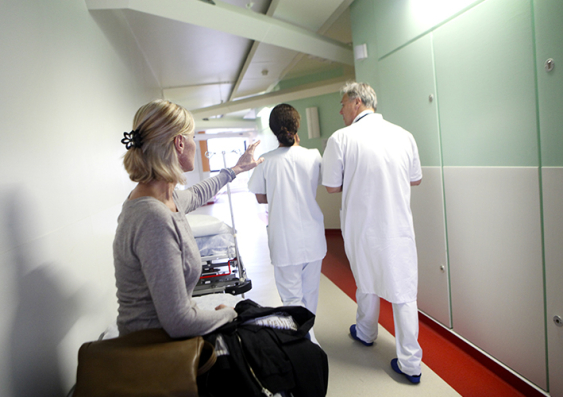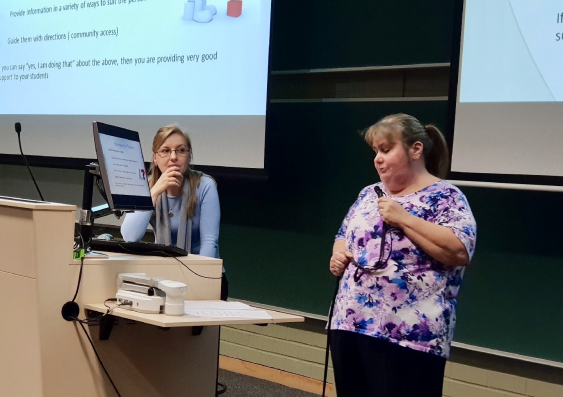Targeted clinician education is making genetic care more inclusive, says a new study.
A toolkit co-produced by people with intellectual disability is helping to improve the quality of the health care they receive.
The was rolled out in 2023 to better educate healthcare workers on how to provide inclusive and respectful genetic health care, and to educate and empower people with intellectual disabilities.
The toolkit includes guidelines and videos on best practice and Easy Read booklets on genetic health care, which provides people with information and support around genetic testing and diagnosis. It was co-produced by ╗╩╣┌▓╩Ă▒ researchers and individuals with intellectual disability and funded by NSW Health.╠ř
Since then, the toolkit has been viewed more than 13,000 times by people in 70 countries.
An evaluation of the toolkit, the results of which were published in this month, showed the resources have been welcomed by healthcare workers, who are changing their practice as a result, as well as those with intellectual disability.
96% of clinicians who responded to a survey about the toolkit agreed or strongly agreed that the toolkit would improve their quality of practice, and 95% agreed or strongly agreed that it was effective.
There was a statistically significant improvement in the respondentsÔÇÖ reported capability, opportunity, and motivation to deliver inclusive genetic health care after engaging with the toolkit.╠ř
This is welcome news to the team of researchers ÔÇô┬áJulie Loblinzk Refalo, and Professor Iva Strnadov├í┬áÔÇô behind the GeneEQUAL project.
Dr Palmer, who is a clinical geneticist and academic at ╗╩╣┌▓╩Ă▒ Medicine & Health, had seen first-hand the challenges people with intellectual disability faced when receiving support and information about genetic tests and diagnosis.
ÔÇťOften they were excluded from the clinical appointments. The person they went with, a parent or support person, was talked at, not them. The language that was used was often very negative and┬ástigmatising ÔÇô┬átalking about a personÔÇÖs ÔÇśmutationÔÇÖ and using a deficit rather than a strengths-based framing,ÔÇŁ Dr Palmer says.
Her concern led her to approach Prof. Strnadov├í and Mrs Loblinzk Refalo, academics from ╗╩╣┌▓╩Ă▒'s┬á,╠ř▓╣▓ď╗ň School of Education,┬áwho collaborate on projects to improve the wellbeing of people with intellectual disability.
Soon after, the researchers commenced the GeneEQUAL project to answer the question, ÔÇśHow can we make genetic health care better for people with intellectual disability?ÔÇÖ┬á
The benefits of co-production are that people with intellectual disability have a say in everything ... As a result, people with intellectual disability have resources that they can truly use and receive better health care.
Starting out
The first step was talking with people with intellectual disability who had experienced genetic health care.
The researchers brought these  to NSW Health, who provided funding support to continue the GeneEQUAL study and create the toolkit.
For clinicians, the toolkit has and videos, on providing inclusive, person-centred and respectful genetic health care.
In addition, there are GeneEQUAL Easy Read , helping them to educate themselves about genetic health care, advocate for their rights and prepare for their appointments.╠ř┬á
"We talked to healthcare workers and people with intellectual disability and they all loved the toolkit. The thing that differed was that some healthcare workers said that [some of the video examples we used] would never happen in real life, but every single person with intellectual disability said, ÔÇśthis has happened to meÔÇÖ and that contrast is such a key message to get across,ÔÇŁ says Dr Palmer.
ÔÇťItÔÇÖs about changing the whole mindset. I teach my students that we shouldnÔÇÖt be seeing ourselves as doctors telling the patient what to do ÔÇô rather part of a partnership,ÔÇŁ Dr Palmer says.
ÔÇťCreating inclusive practices in genetic health care means that opportunity is created to translate a diagnosis into tailored health care, appropriate support, peer connections and reproductive planning,ÔÇŁ she says.
A successful model
The success of GeneEQUAL provides a model for improving health care for people with intellectual disability, using co-production.
Diverse perspectives shaped the co-production of the toolkit from inception to completion, with participants including those with intellectual disability, self-advocate organisations, clinicians, government representatives, and a multidisciplinary team of researchers.
ÔÇťIn our inclusive research team, we always play to our strengths,ÔÇŁ explained Mrs Loblinzk Refalo. And Prof. Strnadov├í adds: ÔÇťThe co-production workshops we started with gave us ideas about what resources needed to be developed so that people with intellectual disability have accessible information explaining what genetic health care is, why itÔÇÖs important, and how to make an appointment.ÔÇŁ
During the next phase of co-production workshops the team shared draft resources and then asked how they could be made better.
ÔÇťWe always received plenty of feedback,ÔÇŁ says Mrs Loblinzk Refalo.
Prof. Strnadov├í adds: ÔÇťThe benefits of co-production are that people with intellectual disability have a say in everything, including what they think the issues are and how they can be fixed. Importantly, as a result of co-production, people with intellectual disability have resources that they can truly use and receive better health care.ÔÇŁ
The collaboration was a first for Dr Palmer, and she believes co-production is the best way to approach research.
ÔÇťSo much medical research is done by health researchers without authentically involving communities, especially priority populations. And all this does is encourage a ÔÇśone-size fits allÔÇÖ model of health care that ends up widening the health equity gap,ÔÇŁ says Dr Palmer.
The team hopes the GeneEQUAL approach will be used in more projects.
ÔÇťOur ever-growing team of co-researchers, health, disability studies, special education and ethics researchers keep coming up with ideas and new plans to fill the gaps that people with intellectual disability highlight to us,ÔÇŁ says Dr Palmer.
ÔÇťOur mode is really transferable, and we truly hope it will inspire others.ÔÇŁ
Mrs Loblinzk Refalo comments: ÔÇťOur hopes for the future are so many that we would need many more lives to make them happen.ÔÇŁ
Prof. Strnadov├í adds: ÔÇťOur big dream is to co-produce a ÔÇśNational Roadmap for Inclusion and Belonging of People with Intellectual DisabilityÔÇÖ to make a real difference in peopleÔÇÖs lives. Because including people with intellectual disability will make life better and enriching for everyone.ÔÇŁ
The GeneEQUAL project has made it clear that co-production is not only feasible but a key to positive healthcare outcomes for those with intellectual disability.
The at ╗╩╣┌▓╩Ă▒ has developed Co-production in Action Guidelines. You can access them, including Easy Read versions, on their .╠ř


.cropimg.width=335.crop=basic.png)
.cropimg.width=335.crop=portrait.png)






